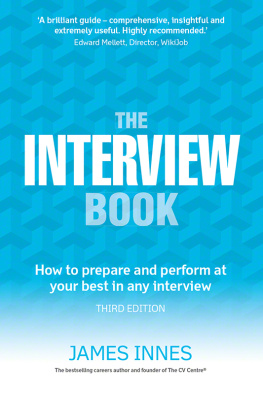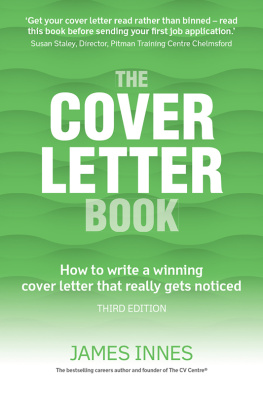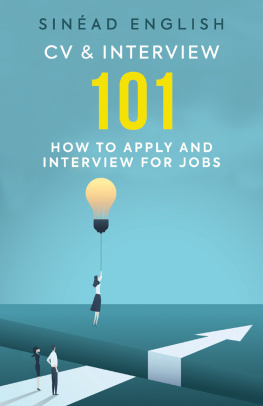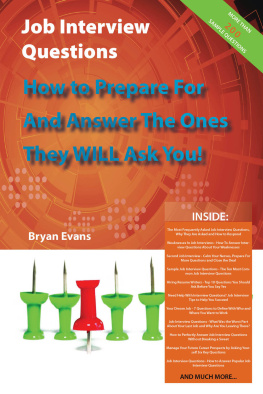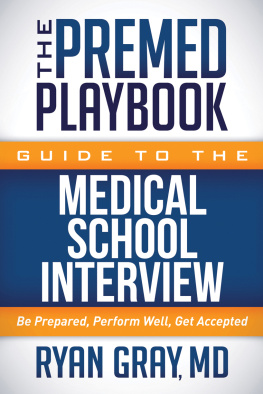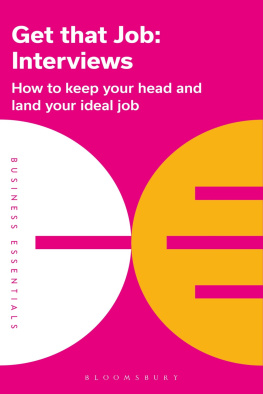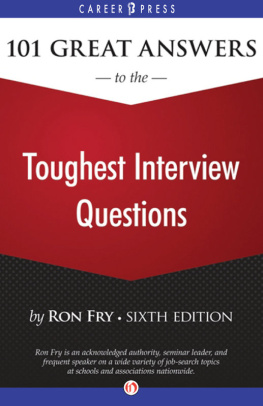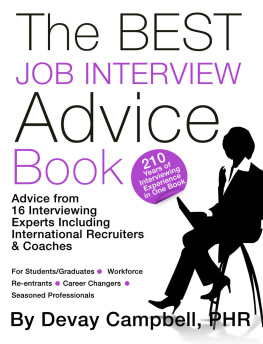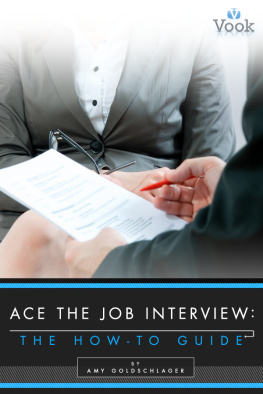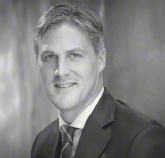James Innes is the founder and chairman of The CV Centre the UKs leading CV consultancy ( www.CVCentre.co.uk ) and part of the James Innes Group.
Following nearly two decades of experience heading up The CV Centre, James is widely considered to be one of the UKs leading careers experts.
James regularly participates at recruitment fairs and conferences as a sought-after guest speaker, as well as being interviewed on TV and radio.
He is the author of a number of best-selling careers books. His current works are: The CV Book , The Cover Letter Book , The Interview Book , The Interview Question & Answer Book and Ultimate New Job .
Acknowledgements
I would like to thank all of my colleagues and clients at The CV Centre, both present and past. Without them it would clearly not have been possible for me to write The Interview Book . In particular, I would like to thank our Chief Executive Officer, Andy Dalziel, Managing Editor, Katy Wilson as well as Amanda Jones and Linda Savill and our former Director of UK Operations, Susan Staley.
I would additionally like to thank Richard Day, our former Director of Technology and Peter Anders Hvass, our Chief Technology Officer, for their significant contributions to the online elements of this book, also Kirk Hullis, our Chief Marketing Officer, for his work on the promotion of the book.
Special thanks go to the team at Pearson Education, in particular Melanie Carter, Eloise Cook, Paul East, Lisa Robinson, Lesley Pummell, Dhanya Ramesh and the editorial services team at Lumina Datamatics and Emma Steel. I couldnt have had better publishers behind me.
Assistance in checking and correcting the text was also provided by Don Elkins, Elisabeth Elkins and Malcolm Innes.
Finally, I would like to thank my wife, Delphine Innes, and my daughter, Aleyna Innes, for their love and support and their toleration of my frequently working very excessively long hours! Je vous aime
Publishers acknowledgements
The questions on page 66 are reproduced from Edenborough (2009) Brilliant Psychometric Tests , Pearson Prentice Hall, Pearson Education Limited 2009.
An apology in advance
It is impossible to write a book of this nature in such a way that all of the content will be perfectly suited to everyone. My readers range from manual workers to senior executives, to office staff and those who work in retail. Some will work in a team; some wont. Some will have a boss; some will be the boss.
Ive done my best to deliver a book which covers, as much as possible, all the different circumstances my readers might be in and all the different issues they might have to face. But there will inevitably be sections which dont apply to your own circumstances or where the focus is either above or below your level in the hierarchy. I can only apologise for this and hope youll be kind enough to forgive me. My advice is to take what you need and to leave the rest.
How to use this book
Theres no doubt about it; this book covers a lot of ground.
However, I appreciate that you may well have an interview to attend later today and simply might not have the time to read everything. I have therefore provided a fast track below by listing the top 15 questions that people ask me about interviews. This should help you to quickly and easily answer the vast majority of the points that are troubling you.
Once youve found the answers to your questions, before heading off for your interview, make sure you spare five minutes to read : My five top tips for interview success. If you only had time to read two pages of The Interview Book , these are the pages I would most like you to have taken the time to read. They encapsulate the most important principles that I cover in the book. Make an effort to accommodate all these when preparing for your interview and youll immediately be well above average.
Id also recommend that you take time to have a good look at : The ten questions youre most likely to be asked. You are absolutely certain to get asked at least some of these questions (or variations of them), if not the whole lot.
The top 15 questions that people ask me about interviews
Right, if youre short on time and need answers fast then this section is for you.
No, Im not talking about the questions you might be asked at interview. Im talking about the questions youd most like to ask me about interviews.
The chances are youve got at least one if not more of the following questions on your mind.
I have compiled this list based on the questions we most frequently get asked at The CV Centre. It contains the top 15 most common questions concerned job hunters ask about interviews; the questions that come up every single day. If youre reading this book then its more than likely that you will be asking yourself many of the same questions.
Each question is listed alongside details of where in this book you can find the answers you are looking for.
All the answers to these questions and many more can be found within The Interview Book . And if you have a question to which you cant find the answer then why not visit our website: www.jamesinn.es
The top 15 questions
- What sort of things should I be reading up on before my interview?
Researching the job
Researching the organisation - What can I do to calm my nerves and be more confident in myself and my abilities?
Mental preparation - What should I wear?
Presentation - Whats all this about body language?
Body language - Whats really important to remember on the day?
The big day - How can I make a really strong first impression?
First impressions count - What can I expect to happen at my interview?
Classic one-on-one interviews - How should I handle a panel interview?
Panel interviews - What are competency-based interviews?
Competency-based, behavioural and situational interviews - How can I prepare for psychometric/aptitude tests?
Psychometric and aptitude tests - I have been asked to give a presentation. Whats the best format?
Presentations - What is an assessment centre?
Assessment centres - What sort of questions am I most likely to be asked?
The ten questions youre most likely to be asked - How can I prepare myself to cope with any tough questions I might be asked?
Yet more questions - What should I ask when its time for me to ask my own questions?

